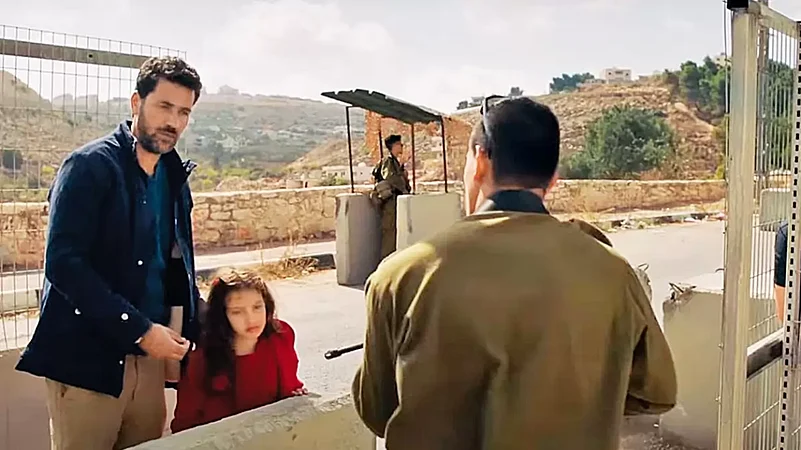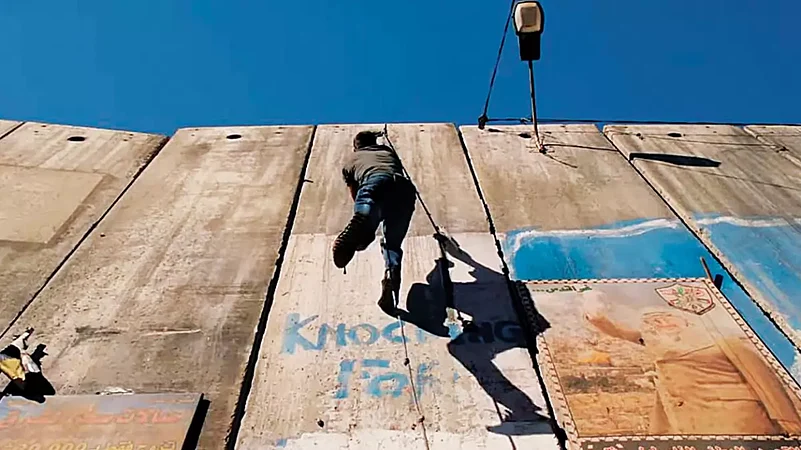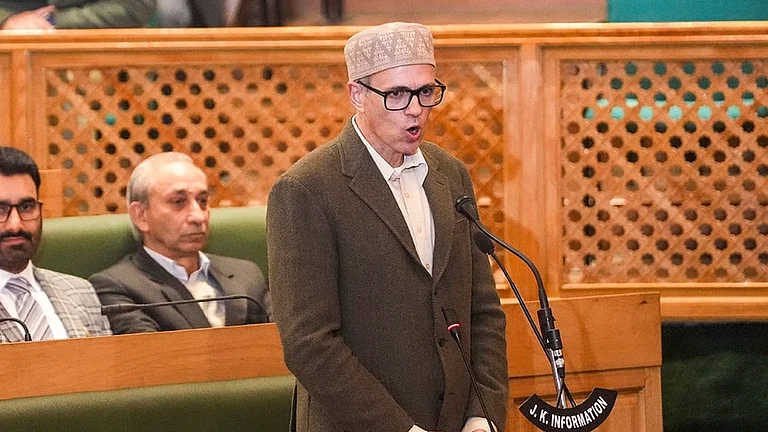The 2013 Palestinian drama Omar opens to its eponymous hero (Adam Bakri), a baker, standing beside a gigantic wall, his T-shirt fluttering in the wind. He waits for a series of cars to pass by. Because what he’s about to attempt demands secrecy and guile: scaling the West Bank barrier. As he grasps a long rope with all his might, planting one foot after the other, holding, slipping, struggling, the camera tracks back to show the extent and the essence of the wall—it’s filled with graffiti comprising a flower, a watering can, phone numbers, Arabic scribbles and, of course, the word “Free” beside a Palestinian flag. This is the wall Omar must climb every time to meet his girlfriend, Nadia (Leem Lubany), who lives on the other side of the Israeli-constructed divide. Sometimes, he slips away without notice; sometimes the security guards spot and shoot at him. A person has become a prisoner.
It’s these visual motifs—of the walls and the checkpoints—that mark two more critically acclaimed Palestinian dramas (among many) in the last decade: The Present (2020) and 200 Meters (2020). In the latter, Mustafa (Ali Sulaiman), a construction worker on the other side of the wall, talks to his daughter by switching a light bulb on and off on a terrace. In The Present, a father and a daughter, Yusef (Saleh Bakri) and Yasmine (Maryam Kanj), cross a checkpoint and deflect threatening security guards so that they can buy a wedding anniversary gift.
These dramas show how cinema can truly capture the cruelties of war—unlike most news reports—because movies aren’t encumbered to answer the five W’s of journalism: who, what, when, where, and why? A film can dial down the informational noise to simply ask how (does it feel?), how (does it change you as a person?), how (to make sense of it all)? And impressive movies can do it all without launching into instructional paragraphs, sermonising stats, obvious messages. They can simply show—and our hearts will tell.

How does architectural language, for instance, reflect a country’s trauma? Consider the narrow gullies that Omar relies on, more than once, to flee and fool the Israeli soldiers. These pathways are so narrow, and so winding, that they don’t aid but impede movement. If you don’t know those gulleys, like many Israeli guards, then they can stop you—trap you. And if you know those gulleys, like Omar, then they can help you hide and escape. This is architecture as life saver, as last-minute cheat code.
Grill steel barricades, too, feature a lot in these movies, especially in 200 Meters and The Present, which swallow the identities of the individual Palestinians, reducing them to either toiling cogs or intrusive eyesores. Their lives become a function of the Israeli soldiers’ whims. Their essence stripped down to unpredictable binaries: allowed, not allowed; legal, illegal; in, out. To capture such harrowing realities, The Present’s director, Farah Nabulsi, turned to ‘guerrilla filmmaking’. The drama opens to a scene filmed at the actual Bethlehem Checkpoint, surreptitiously, uniting the director and his protagonist: Palestinians fed up of asking permissions. “The hundreds of Palestinians in that scene are actual Palestinians going to work at the crack of dawn,” said Nabulsi in a 2020 interview. “I had a whole philosophical conversation about whom should we take permission from, to film such a monstrosity. I just decided to take the risk.”
A conflict not just alters landscapes but also mindscapes, making morality volley like a ping-pong ball. So several characters in Omar—ranging from the Palestinian rebels to the Israeli soldiers—lie, manipulate, and deceive to reach their goals. The film is filled with backstabbers and traitors who thrive via cruel deceptions, perpetually living so close to the edge that they’ve run out of space to accommodate anyone else. In 200 Meters, lies serve an essential—even a more worthy—function: self-preservation and compassion.

The leads of The Present and 200 Meters share a physical ailment, too: their backs hurt. As if the emotional pain that weighs them down has become literal. Both Omar and 200 Meters also set many scenes in large fields populated by abandoned cars and discarded couches—a poignant way to show how a country has become a junkyard. Staying true to real-life events, these films have both bleak stories and ends. Except, to some extent, The Present. While returning from their shopping trip, where they’ve bought a fridge, Yusef and Yasmine meet the same insulting Israeli officer. After a long interrogation, he allows them to leave but...the fridge won’t fit inside the narrow gate. Right across the steel grills, though, stretches a wide road that can solve all problems. But the guard refuses. Yusef screams. Nothing changes. Just then, in an act of quiet protest, Yasmine begins to wheel the fridge on the road. The Israeli soldiers can do nothing but look because Yasmine is a kid and even they know that, under no circumstances, you don’t harm a kid. That is fiction though: kids being insulated from harm in the Israeli-Palestinian war has not been true for a very long time. But maybe it makes sense: that real life is so brutal for Palestinians that even empathetic dramas fall short.
(This appeared in the print as 'Visually Speaking')































